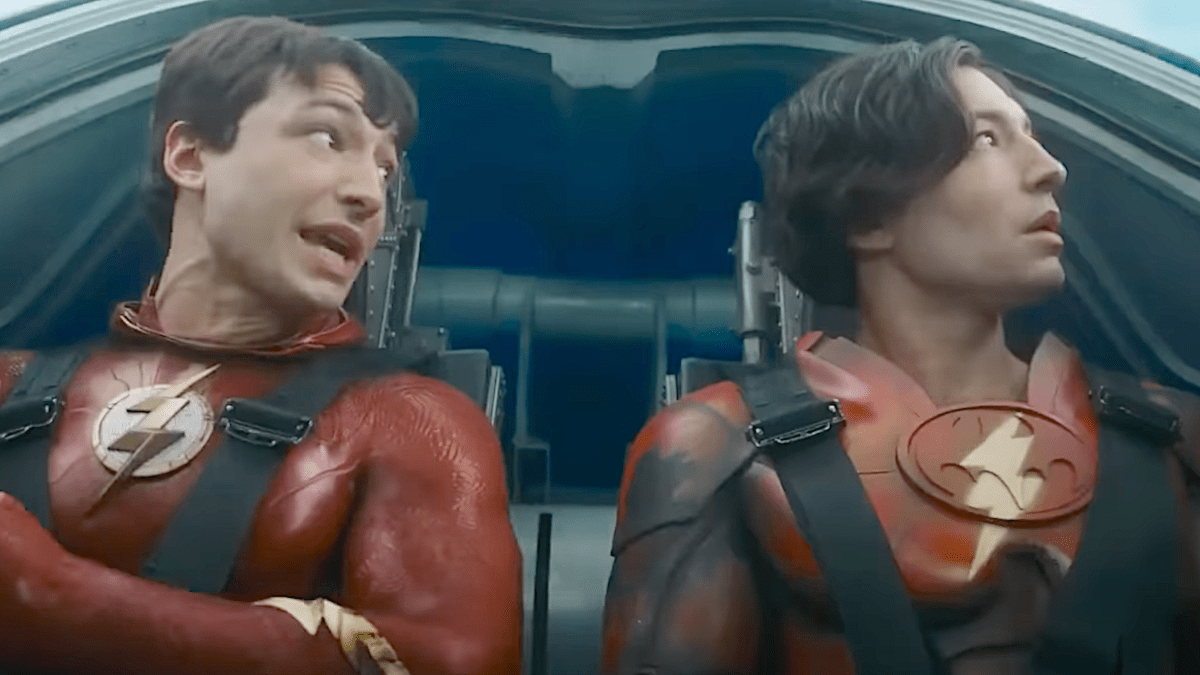“Ezra Miller.” Just speak the name in public and watch a heated debate grow like wildfire. Or just watch it online, without fear of someone’s spit hitting you in the eye. Twitter is affording front-row seats to the dispute, which is heating up again as we get closer to the June 16 release of The Flash. The film has earned some pretty rave early reviews, but a lot of people still won’t see it, given the accusations against the young actor.
Among several widely reported incidents, Miller was caught on video choking a woman at a bar in Iceland in 2020, then later that year had a physical altercation with two people at a karaoke bar in Hawaii. Miller is said to have been the reason for 10 calls to the police over a period of weeks in the island state, then had a restraining order filed against them by a couple who Miller was staying with. Later that same month, the actor was arrested for throwing a chair that struck a woman’s head when they were asked to leave a private residence.
The news that got the most media attention was undoubtedly Miller’s relationship with Indigenous activist Tokata Iron Eyes, which began in 2016 when she was just 12 years old and Miller was 23. Her parents claimed that Miller’s influence caused Iron Eyes to drop out of school and believe she was transgender. The parents also said Miller had caused bruises on Tokata’s body.
Now that The Flash is just weeks away from opening, Twitter users are circling the wagons to boycott one of the summer’s biggest releases:
As expected, responses have not been 100% supportive of a boycott, ranging from simply “we don’t care” to “none of that is true.” The former camp at least admits they have little interest in stars’ personal lives and just want to see a cool movie. The latter camp seems to believe all of these incidents coincidentally involving the same person are somehow being blown out of proportion, even though at least one assault was caught on video.
Complicating the narrative (or not, depending on your point of view) is that Miller issued a public apology last summer, saying, “Having recently gone through a time of intense crisis, I now understand that I am suffering complex mental health issues and have begun ongoing treatment. I want to apologize to everyone that I have alarmed and upset with my past behavior.” Miller added, “I am committed to doing the necessary work to get back to a healthy, safe, and productive stage in my life.”
Obviously, a slew of inappropriate behaviors reported across a two-year period does constitute an “intense crisis.” And while mental health issues are never an excuse for hurting people, they do constitute a reason for doing so. Some people believe Miller deserves the chance to get better.
The thing we want to firmly call BS on here is the argument that Iron Eyes’ recent statements saying Miller did not, in fact, groom her somehow absolve the actor of that allegation. Luckily, Twitter can make that point for us, too:
Indeed, people can’t always tell when they’ve been groomed. The act itself suggests a subtle kind of manipulation, which by a more sensational name is known as brainwashing. Third parties are often more capable of offering an opinion on grooming than the victims themselves — perhaps not the Twitter gallery, but authorities and professionals who specialize in child abuse.
Ultimately, the choice facing moviegoers isn’t simply to either watch The Flash in theaters or to never watch it. It’s whether to boycott a movie that thousands of people who aren’t Ezra Miller worked on and poured their hearts into. It’s whether to hold onto your money and watch the film when it’s available on the newly renamed Max in 4K. And it’s whether to believe that Miller can actually come out of this a better person.
Make no mistake, if superheroes are your thing, you’ve got a pick a path here. Unlike the speedster he portrays, Miller can never outrun this controversy — and neither can we.

